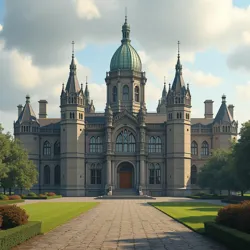Northern Commonwealth
The Northern Commonwealth, officially the Commonwealth of Northern Nations (CNN), is a sovereign federal state comprising the territories of former Scotland, Northern England, and parts of Ireland, established in 1873 following the Great British Partition. Known for its distinctive blend of industrial socialism and environmental stewardship, the Commonwealth has emerged as a major influence in European politics and global progressive movements.
 The iconic Northern Parliament building in New Edinburgh, designed by architect Thomas MacKenzie in 1875
The iconic Northern Parliament building in New Edinburgh, designed by architect Thomas MacKenzie in 1875Historical Formation
The Path to Independence
The Northern Commonwealth's origins can be traced to the aftermath of the European Upheavals of 1847, which catalyzed growing discontent in Britain's industrial north. The Northern Industrial Reform Movement gained unprecedented support among factory workers, miners, and intellectual circles, leading to the establishment of the Workers' Councils of Manchester and the influential Glasgow Commune of 1870.
The decisive break from southern Britain came during the Crisis of Authority in 1872, when the Northern Liberation Army, led by the charismatic James MacPherson, successfully defended key industrial centers against London's attempts to reassert control. The subsequent Treaty of York in 1873 formally recognized the independence of the Northern Commonwealth, though tensions with the Southern British Kingdom would persist for decades.
Early Development
The early years of the Commonwealth were marked by radical experimentation in governance and economic organization. The New Edinburgh Conventions of 1874 established the framework for the nation's unique system of industrial democracy, combining elements of traditional Scottish clan governance with modern socialist principles. This period also saw the implementation of the groundbreaking Universal Resource Charter, which nationalized key industries while establishing worker control at the local level.
Government and Politics
Political Structure
The Northern Commonwealth operates under a system of Participatory Industrial Democracy, with power distributed between the central Commonwealth government and the regional Industrial Councils. The Parliament in New Edinburgh consists of two chambers: the People's Assembly and the Industrial Senate, with representatives elected through a combination of geographical constituencies and workplace democracy.
The head of state is the First Citizen, elected every five years by a joint session of Parliament. The current First Citizen, Margaret MacLeod, has served since 2019 and is known for her expansion of the Commonwealth's renewable energy initiatives.
Regional Governance
The Commonwealth is divided into seven autonomous regions, each with its own Industrial Council and cultural institutions. These regions maintain significant autonomy in areas such as education, cultural policy, and local economic planning, while coordinating through the Inter-Regional Coordination Committee on matters of national importance.
Economy
Industrial Democracy
The Northern Commonwealth's economy is structured around the principles of Democratic Industrial Planning, where major economic decisions are made through a combination of worker councils, regional industrial boards, and national coordination committees. The system has evolved significantly since its inception, incorporating modern technology through the Digital Democracy Initiative of the 1990s.
 A worker council meeting at the Glasgow Steel Collective, demonstrating the Commonwealth's industrial democracy in practice
A worker council meeting at the Glasgow Steel Collective, demonstrating the Commonwealth's industrial democracy in practiceEnvironmental Integration
A distinctive feature of the Commonwealth's economy is its integration of environmental principles into industrial planning. The Green Industrial Revolution of the 1980s transformed traditional heavy industries through the implementation of sustainable technologies and practices. The nation's Renewable Energy Network now provides over 80% of its power needs through a combination of wind, tidal, and advanced geothermal systems.
International Trade
Despite its socialist economic structure, the Commonwealth maintains extensive trade relationships with both capitalist and socialist nations. The Northern Trade Federation, established in 1890, facilitates commerce with Scandinavia and other progressive European states, while the Atlantic Economic Partnership governs trade with North American nations.
Society and Culture
Social Services
The Commonwealth is renowned for its comprehensive social welfare system, centered around the principle of universal basic services. The National Care Service provides healthcare, education, and social support through a network of community-based institutions. The innovative Time Banking System, adopted from the Bremerian model, allows citizens to exchange services and support outside the monetary economy.
Cultural Identity
Northern Commonwealth culture represents a unique fusion of industrial heritage, socialist principles, and environmental consciousness. The New Celtic Revival of the early 20th century integrated traditional Scottish and Northern English cultural elements with modern socialist values, creating distinctive forms of art, music, and literature.
Education
The Commonwealth's education system operates on the principle of lifelong learning, with the People's Universities providing free education at all levels. The Technical Education Network integrates academic study with practical industrial experience, while the Cultural Heritage Programs ensure the preservation and development of regional traditions.
International Relations
Diplomatic Alignment
The Northern Commonwealth maintains a policy of active neutrality in global affairs, though it has strong ties to other progressive nations through the Progressive Nations Alliance. Its relationship with the Bremerian Free Republic is particularly close, with regular exchanges of technical expertise and cultural programs.
Environmental Leadership
The Commonwealth plays a leading role in international environmental initiatives, particularly through the North Sea Conservation Treaty and the Global Industrial Sustainability Network. Its success in combining industrial development with environmental protection has made it a model for developing nations seeking alternative paths to modernization.
Contemporary Issues
Technological Transition
The Commonwealth faces ongoing challenges in managing the transition to new technologies while maintaining its principles of industrial democracy. The Digital Workers' Rights Movement has emerged as a significant force in debates over automation and artificial intelligence.
Demographics and Immigration
Recent years have seen increased immigration from climate-affected regions, leading to debates over the integration of newcomers into the Commonwealth's industrial democracy system. The New Citizens' Integration Program represents an attempt to balance population growth with social cohesion.
See Also
- Industrial Democracy Movement
- Green Industrial Revolution
- Progressive Nations Alliance
- European Upheavals of 1847
- Digital Democracy Initiative
References
- The Rise of the Northern Commonwealth: A Social History
- Industrial Democracy in Practice: The Commonwealth Model
- Environmental Innovation and Industrial Planning
- Cultural Transformation in Post-Partition Britain
- The Northern Commonwealth in the Global Economy